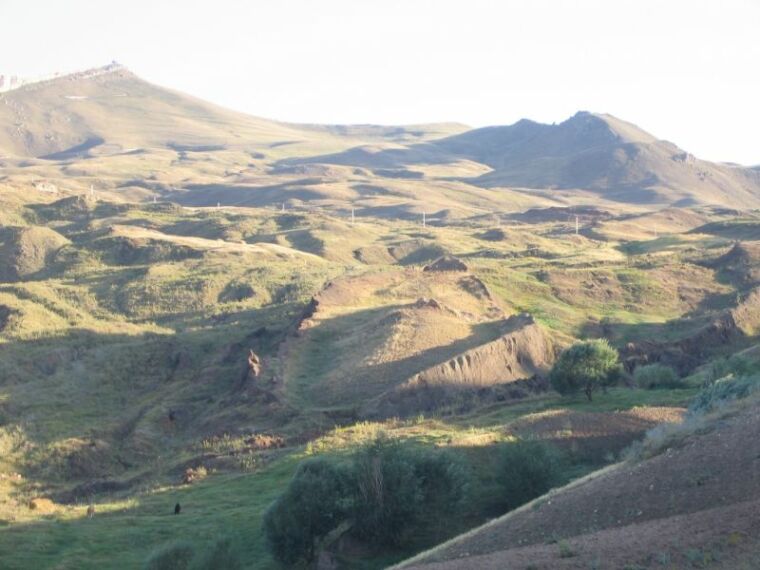Explorer claims to have found evidence of Noah's Ark in Turkey's Mount Ararat

A California-based explorer has claimed that he has found new evidence that Noah's Ark rested on Mount Ararat in modern-day Turkey and the boat's remains are still up on the mountain.
More than 100 researchers from across the globe recently gathered for a three-day international symposium on Mt. Ararat and Noah's Ark in Ağrı in Turkey to find out if they can discover the boat's final resting place.
Raul Esperante of the Seventh-day Adventist Church-sponsored Geoscience Research Institute has expressed plans to visit sites around the mountain to look for new evidence.
"My purpose is to visit the sites around the mountain to find clues about catastrophic events in the past," Esperante said, according to Public Radio of Armenia.
In 2010, evangelical Chinese and Turkish researchers went on an expedition to the region to find the remains of the ark. After a few weeks, the team claimed to have found wooden specimens from an "ark-like" structure around 13,000 feet up Agri Mountain, the highest peak in Turkey.
The researchers went on to claim that carbon dating had revealed the wood to be around 4,800 years old, putting it at the same historical period when the flood was said to have occurred.
Esperante said that the discovery requires more "rigorous, serious scientific work" and he has asked for more funds to continue the research.
"The result of my findings will be published in books, publications and journals, but at this point it is too early to know what we are going to find," Esperante said, as reported by The Nation.
"Once the scientific community knows about the existence of Noah's Ark in Mount Ararat, we can make it available to the general public," he added.
Dr. Andrew Snelling, a young-Earth creationist with a Ph.D. from the University of Sydney, contended that Mount Ararat cannot be the final resting place of the ark because the mountain did not form until after the flood waters receded.
Brent Landau, a biblical scholar at the University of Texas at Austin, told Newsweek that there had been many claims that the ark had been discovered around Mount Ararat. He asserted that the investigations are not being conducted from a "neutral scientific perspective" because the claims are "almost always" made by those who biblical literalists.
Landau is one of several scientists who have accepted evidence that the great flood could have occurred, although the timeline differs a bit from what appears in Genesis.
He noted that all of the previous claims about the 'Ark have turned out to be either "outright hoaxes" or "natural rock formations that look somewhat like a giant boat." He said that he is "quite confident that this present claim will turn out to be more of the same."
 Christians don't have to affirm transgenderism, but they can’t express that view at work: tribunal
Christians don't have to affirm transgenderism, but they can’t express that view at work: tribunal Archaeology discovery: Medieval Christian prayer beads found on Holy Island
Archaeology discovery: Medieval Christian prayer beads found on Holy Island Presbyterian Church in America votes to leave National Association of Evangelicals
Presbyterian Church in America votes to leave National Association of Evangelicals Over 50 killed in 'vile and satanic' attack at Nigerian church on Pentecost Sunday
Over 50 killed in 'vile and satanic' attack at Nigerian church on Pentecost Sunday Ukrainian Orthodox Church severs ties with Moscow over Patriarch Kirill's support for Putin's war
Ukrainian Orthodox Church severs ties with Moscow over Patriarch Kirill's support for Putin's war Islamic State kills 20 Nigerian Christians as revenge for US airstrike
Islamic State kills 20 Nigerian Christians as revenge for US airstrike Man who served 33 years in prison for murder leads inmates to Christ
Man who served 33 years in prison for murder leads inmates to Christ


 Nigerian student beaten to death, body burned over ‘blasphemous’ WhatsApp message
Nigerian student beaten to death, body burned over ‘blasphemous’ WhatsApp message 'A new low': World reacts after Hong Kong arrests 90-year-old Cardinal Joseph Zen
'A new low': World reacts after Hong Kong arrests 90-year-old Cardinal Joseph Zen Iran sentences Christian man to 10 years in prison for hosting house church worship gathering
Iran sentences Christian man to 10 years in prison for hosting house church worship gathering French Guyana: Pastor shot dead, church set on fire after meeting delegation of Evangelicals
French Guyana: Pastor shot dead, church set on fire after meeting delegation of Evangelicals ‘Talking Jesus’ report finds only 6% of UK adults identify as practicing Christians
‘Talking Jesus’ report finds only 6% of UK adults identify as practicing Christians Mission Eurasia ministry center blown up in Ukraine, hundreds of Bibles destroyed: 'God will provide'
Mission Eurasia ministry center blown up in Ukraine, hundreds of Bibles destroyed: 'God will provide' Church holds service for first time after ISIS desecrated it 8 years ago
Church holds service for first time after ISIS desecrated it 8 years ago Burger King apologizes for 'offensive campaign' using Jesus' words at the Last Supper
Burger King apologizes for 'offensive campaign' using Jesus' words at the Last Supper Uganda: Muslims abduct teacher, burn him inside mosque for praying in Christ’s name
Uganda: Muslims abduct teacher, burn him inside mosque for praying in Christ’s name